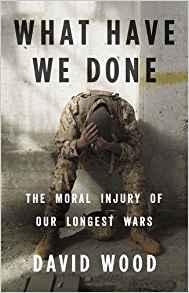 David Wood, What Have We Done; The Moral Injury of Our Longest Wars (New York: Little, Brown and Company, 2016), 291pp.
David Wood, What Have We Done; The Moral Injury of Our Longest Wars (New York: Little, Brown and Company, 2016), 291pp.
There are about two million American veterans who have returned home from fighting our wars in Iraq and Afghanistan. Many of them come back with horrible physical injuries. Others, we now realize, need help with psychological trauma like PTSD. David Wood's new book examines a "dark truth" about war that is largely ignored and rarely addressed, much less treated — that many veterans come home with moral injuries or "wounds of the soul" that are related to but different from physical and psychological wounds.
By moral injury he means the guilt, shame, grief, sorrow, and regret that veterans experience because of what they have seen and done. The term was first coined by a VA psychiatrist named Jonathan Shay in his 1994 book Achilles in Vietnam; Combat Trauma and the Undoing of Character.
There's a glaring and deeply disturbing paradox about war. When the soldiers return home, we greet them as heroes. But they themselves know that their success in war demands that they kill their fellow human beings. "It's a profound and unpleasant truth," writes Wood, "and each one of us knows it, deep down. Under any circumstance, killing another human exacts a moral cost. We send men and women into war knowing that they will collide with a moral choice no one can resolve: in order to be good soldiers they must kill; and killing violates one of our oldest taboos" (144).
Wood has been a war reporter all over the world for thirty-five years. In 2012 he won the Pulitzer Prize for his series on severely wounded veterans of the wars in Iraq and Afghanistan. He grew up as a Quaker, and during the Vietnam war spent two years as a conscientious objector in the national civilian service. He never judges our veterans; quite the opposite. He honors their service, and the terrible burden we, who never experience war, have asked them to bear. Drawing upon his personal experiences, the growing medical literature about moral injury, and innovative treatment programs, he's written a book that should help us all (and not just the experts) give our veterans the help they need and deserve.


